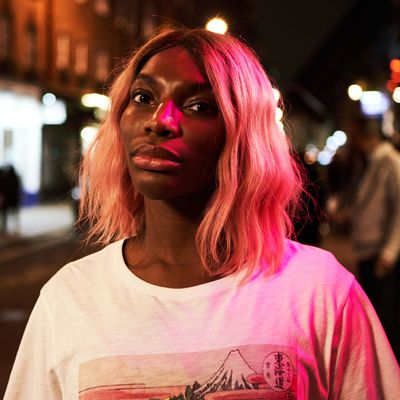
I would probably drop my sexual experiences into several imprecise buckets, something like: great, okay, weird, and bad.
In the “bad” bucket, where I do myself the fewest favors in this exercise, I might put the sex that was uncomfortable in some way, or the murky hookups and one-night stands. Maybe more disconcerting occasions, too, like when a partner said, playfully but firmly, they wouldn’t wear protection, or an instance with an older boyfriend from my teenage years I’ve mulled over for a decade, wondering if it “counts” as something more than bad sex.
I know many people who have had similar experiences, and have used similar language to describe them: It wasn’t bad; it wasn’t good; I don’t remember much; probably not again; did I want it? I’m not sure. It was weird. A vague script.
Michaela Coel’s new HBO show I May Destroy You pushes this script much further (warning: spoilers ahead). Arabella, played by Coel, is this story’s center, a writer living in East London. She’s unfocused, racing to finish a draft of her second book on a deadline, and decides to meet up with friends for a break. Shots, dancing, coke. She wakes up the next morning in front of her laptop and she’s confused, bruised and bleeding from a cut on her forehead. She doesn’t remember much until a squeaky door spurs a flashback from the night before: a tiny red room and a door banging in time with a stranger. He’s thrusting, furiously.
The encounter is modeled on something that happened to Coel, who in 2018 said she was drugged and sexually assaulted by strangers while writing Chewing Gum, her first show. Arabella’s experience, which she reports to the police, becomes I May Destroy You’s through line, and to develop it Coel moves from the violent assault into more seemingly ambiguous sexual encounters. “There are so many different kinds of sexual assault,” Arabella huffs after a visit to the police station about her case — coming to terms with that fact is partially the point of the show.
This curiosity is what distinguishes I May Destroy You from others in the cadre of post–Me Too entertainment. Rather than immediately reducing bad sexual encounters into a singular label, it digs, peeling back the layers of power and privilege that are always at play when a person is assaulted. In doing so, it engages more capably and thoughtfully with the narrative of victimhood and the nature of harm than anything else in its genre. A genre whose harbingers — Bombshell, The Assistant, The Loudest Voice — have often framed these stories as not only straight and white, but unambiguous.
Several weeks after she is raped, Arabella has sex with a colleague who slips off his condom without her knowledge. Feigning curiosity, she asks the officer investigating her initial case about nonconsensual condom removal — essentially if it “counts” as anything. “That’s rape,” says the officer, simply. In another instance, Arabella’s friend Kwame (Paapa Essiedu) is sexually assaulted by a man right after they have consensual sex. Kwame is horrified, and unsure enough to Google whether nonconsensual humping (frotteurism) is a crime (it is).
Both encounters reflect troubling realities: how there’s often a muddled sense of what constitutes sexual assault and rape (in both legal and social arenas); how over half of assaults come from an intimate partner, and nearly half from an acquaintance; and what might happen when a person reports (or attempts to report) an assault or speak out against a perpetrator. When Arabella names one of her rapists, for example, she does so in a public forum and it goes viral on social media, a sequence that almost parodies a Me Too–esque takedown. When Kwame attempts to report his assault, the cop he speaks with is uncomfortable and flippant, and Kwame, unsure about what happened to him in the first place, simply gives up and leaves. The experience, which is marked by skepticism and lack of action on the part of the police, is also not uncommon for sexual-assault survivors, and is what advocates point to as one reason why so many sex crimes go unreported or un-investigated.
Another reason, which Kwame also experiences, is articulated by a woman in an assault-survivors support group Arabella visits later in the show, who explains what happened when she tried to report an instance of workplace harassment: “They ask you what happened, and then you try to define what happened, and I hear myself out loud and I end up undermining myself.”
Stories that speak to complicated — and unpleasant — sexual experiences tend to find large audiences online. Consider the popularity of something like “Cat Person,” the 2017 short story by Kristen Roupenian, about a repulsive, dissociative sexual encounter; or even the viral 2018 babe.net article about Aziz Ansari, which plenty of people decided was an example of a young woman complaining about bad sex — but was perhaps a better example of shortfalls in precision and empathy when it comes to talking and even thinking about intimacy.
Never before has a show spent so much time on those “gray area” experiences that are so often written off as uncomfortable, or the ubiquitous “bad sexual encounter.” I May Destroy You not only models and analyzes those encounters, it wants to know what happens when we introduce different elements: How do race, class, sexuality, and gender identity play into power? How do those factors affect what happens if you speak out? And why do we undermine ourselves when we know — as we so often do — something bad has happened to us?
Part of the answer to this last question is that we exist in a patriarchal ecosystem, one built in opposition to people who aren’t white, cisgender, and wealthy. To treat pain involving people that aren’t these things as consequential — as I May Destroy You does — is radical.
I wondered often while watching it what the title referred to; who is destroying whom? The rapist, destroying the lives of their victims? The victim, when they name them? Or is the destruction even more inward? The fear of confronting our own bad sexual encounters, seeing them for what they are, and wondering where we’ll go from there; it may destroy you, but Coel seems interested in showing us what can happen when it doesn’t.
I May Destroy You doesn’t really try to advance feminist perspectives on assault; the concepts already exist, but Coel’s careful exploration of her own themes make it the tour de force it is. She does away with the myth that sexual assaults are rare or exceptional, and broadens the viewers’ understanding of what constitutes sexual assault — in other words, what “counts.”


